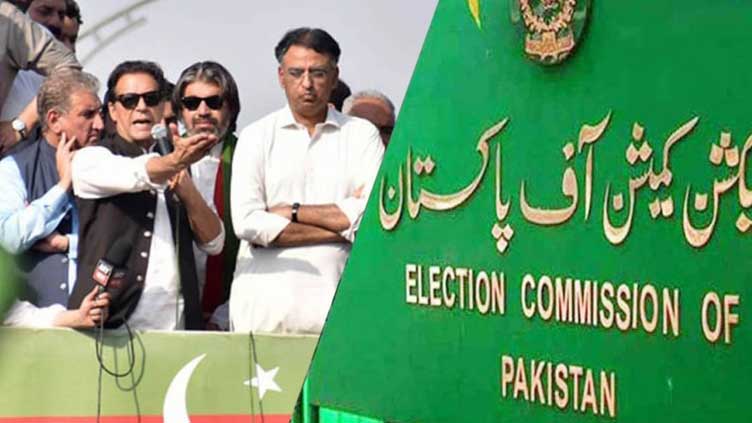ECP issues arrest warrants for Imran Khan, other PTI leaders in contempt case

Pakistan
ECP issues arrest warrants for Imran Khan, other PTI leaders in contempt case
ISLAMABAD (Dunya News) – The Election Commission of Pakistan (ECP) on Tuesday issued bailable arrest warrants for PTI Chairman Imran Khan and other party leaders in a contempt case.
A four-member bench of the top electoral body rejected the exemption pleas filed by Mr Khan, Fawad Chaudhry, Asad Umar and others. It directed the former prime minister and PTI bigwigs to sumbit surety bonds of Rs50,000 each to get bail. The ECP had reserved the verdict of the case some time ago.
Following the verdict, Mr Chaudhry has announced to file a contempt of court case against the ECP for issuing bailable arrest warrant.Taking to twitter, former information minister said the ‘biased’ decision to issue arrest warrants was a contempt of the high court’s verdict.
Last week, the Supreme Court (SC) had allowed the election watchdog to continue its proceedings against the PTI chief and other party leaders in the contempt case filed against them over controversial remarks against the electoral body. The decision was announced by a three-member bench, headed by Chief Justice Umar Ata Bandial and comprising Justice Athar Minallah and Justice Ayesha A Malik, but it restrained the ECP from issuing a final order.
Last year, the top electoral body initiated contempt proceedings against the PTI leaders for allegedly using foul language against Chief Election Commissioner Sikandar Sultan Raja and the ECP. It served several notices on them, asking them to appear in person and explain their point of view. However, the PTI leaders did not appear before the ECP and later challenged its powers to initiate contempt proceedings under Section 10 of the Election Act 2017 in high courts.
The Section 10 of the election act states that the “election commission may exercise the same power as the high court to punish any person for contempt of court and the Contempt of Court Ordinance, 2003 (V of 2003), or any other law pertaining to contempt of court shall have effect accordingly[…]”
Later, the ECP filed a petition with the Supreme Court, seeking consolidation of all the six petitions before one high court. In its decision, the top court said the ECP had been allowed to continue proceedings under Section 10 against the PTI leaders but it barred the electoral body from giving final orders. The order stated that the high courts had not barred the commission from contempt proceeding against the PTI leaders who have questioned the incompetence of the ECP officer.
“As these objections have been raised in the pending proceedings under section 10 before the ECP and the same are required to be considered and decided by it before passing any final order. We hold that the petitioner [ECP] may continue its proceedings in accordance with law including, by decisions on the objections raised on behalf of the respondents,” the SC order added.
The top court has also barred courts from interrupting the operation of a statutory provision to the ECP. “[…] Unless a statute or statutory provision is finally declared to be ultra vires the Constitution, its normal operations can be curtailed by an interim order.” Later, the court disposed of the ECP petition.

